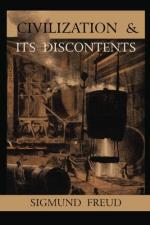
|
| Name: _________________________ | Period: ___________________ |
This test consists of 5 short answer questions, 10 short essay questions, and 1 (of 3) essay topics.
Short Answer Questions
1. What does Freud say is the limit of Eros?
2. Where does Freud say the remorse of conscience ultimately originates?
3. What effect do violent men have on society?
4. What does Freud say libido intersects with, at a certain point?
5. What does Freud say he would have to do to fulfill this motto?
Short Essay Questions
1. In what three spheres does Freud see the same interplay between Eros and death playing out?
2. How does Freud say unconscious guilt expresses itself?
3. Where does Freud say the feeling of guilt originates?
4. What services does Freud say the Jewish people served for the Aryans in Europe?
5. How does Freud characterize the mindset of people who do not appreciate the reality he is describing, of hostility as a fundamental force of human nature?
6. In what way does Freud say that primitive man was indeed happier than civilized man?
7. How does Freud characterize the emergence of the death instinct?
8. How do sadism and masochism reveal the interplay between Eros and death instincts, in Freud's account?
9. How does Freud explain the origin of remorse?
10. What conclusion does Freud’s discussion of the Golden Rule lead him to make about human nature?
Essay Topics
Write an essay for ONE of the following topics:
Essay Topic 1
Describe Freud’s treatment of women, and their place in his theories. How would Civilization and its Discontents be different if it were written based on a woman’s perspective?
Essay Topic 2
Who is the audience for Civilization and Its Discontents? What is the ideal reader for Civilization and Its Discontents likely to think about the book’s main topics? How does this book try to affect the reader? What is it trying to teach him or her, or get him or her to do?
Essay Topic 3
When is Civilization and Its Discontents most itself? What is its characteristic passage, or moment? What makes that moment or passage the most representative of the book as a whole? Are there any places where the book seems to depart from its typical self, as if to become a different book?
|
This section contains 988 words (approx. 4 pages at 300 words per page) |

|




